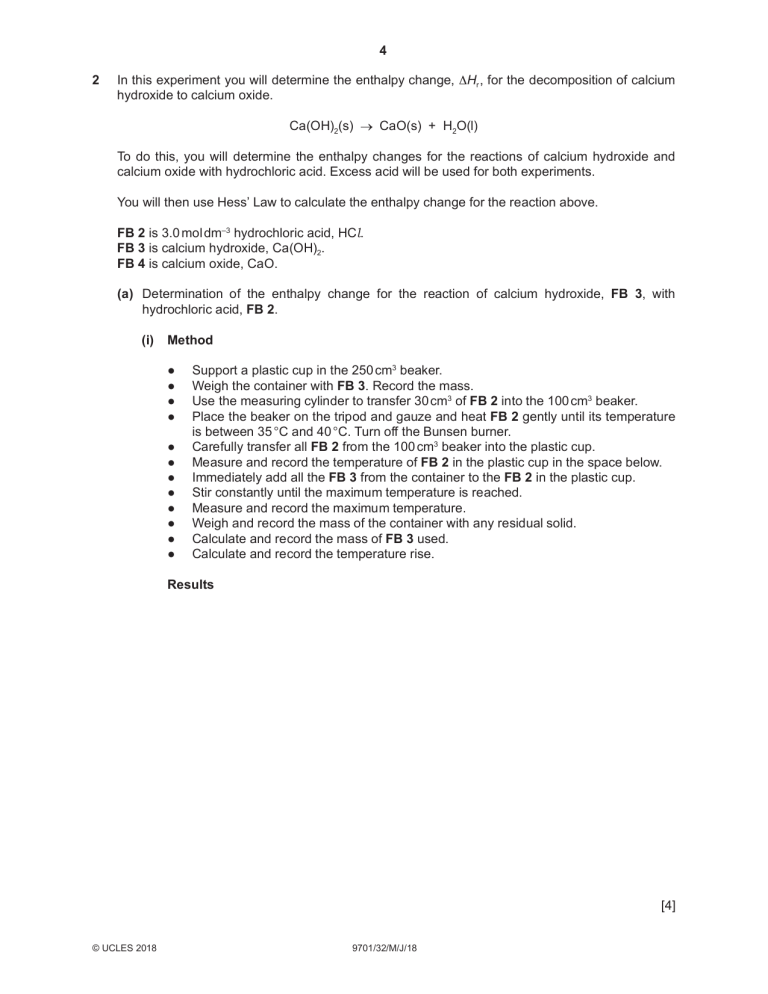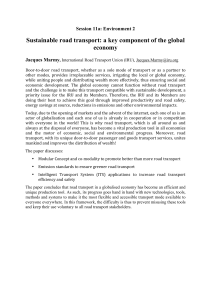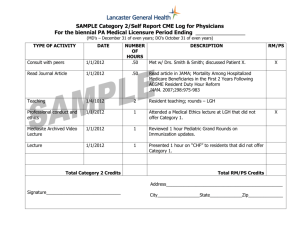
, W L H SHULPH W R LOO GHWHUPL H W H H W DOS F D GUR LGH WR FDOFL P R LGH Ca(OH) H Δ U IRU W H GHFRPSR LWLR RI FDOFL P CaO(s) + H 2 O R GR W L R LOO GHWHUPL H W H H W DOS F D H IRU W H UHDFWLR RI FDOFL P FDOFL P R LGH LW GURF ORULF DFLG ( FH DFLG LOO EH HG IRU ERW H SHULPH W R ) ) ) LOO W H H +H D WR FDOF ODWH W H H W DOS F D GUR LGH D G H IRU W H UHDFWLR DERYH is 3.0 mol dm hydrochloric acid, HC is calcium hydroxide, Ca(OH) is calcium oxide, CaO. HWHUPL DWLR RI W H H W DOS GURF ORULF DFLG ) 0 ● ● ● ● ● ● ● ● ● ● ● ● F D H IRU W H UHDFWLR RI FDOFL P GUR LGH ) LW R Support a plastic cup in the 250 cm EHDNHU Weigh the container with ) HFRUG W H PD Use the measuring cylinder to transfer 30 cm RI ) into the 100 cm EHDNHU Place the beaker on the tripod and gauze and heat ) H WO WLO LW WHPSHUDW UH is between 35 °C and 40 °C. Turn off the Bunsen burner. Carefully transfer all ) from the 100 cm EHDNHU L WR W H SOD WLF F S Measure and record the temperature of ) L W H SOD WLF F S L W H SDFH EHOR Immediately add all the ) IURP W H FR WDL HU WR W H ) L W H SOD WLF F S Stir constantly until the maximum temperature is reached. Measure and record the maximum temperature. Weigh and record the mass of the container with any residual solid. Calculate and record the mass of ) HG Calculate and record the temperature rise. 5 [4] 8 / 0 F RQ Calculate the energy produced during this reaction. [Assume that 4.2 J of heat energy changes the temperature of 1.0 cm RI RO WLR E 1.0 °C.] energy produced = .............................. J [1] Calculate the number of moles of calcium hydroxide, ) HG L W H H SHULPH W moles of Ca(OH) = .............................. mol [1] Calculate the enthalpy change, in kJ mol–1, for reaction 1 below, Δ Ca(OH) (s) + 2HC (aq) CaC (aq) + 2H 2 O Δ 8 / 1 0 1 = ...... ............................. kJ PRO–1 L YDO H [1] E HWHUPL DWLR RI W H H W DOS F D DFLG ) 0 ● ● ● ● ● ● ● ● ● ● ● ● H IRU W H UHDFWLR RI FDOFL P R LGH ) LW GURF ORULF R Support the second plastic cup in the 250 cm EHDNHU Weigh the container with ) HFRUG W H PD into the 100 cm EHDNHU Use the measuring cylinder to transfer 30 cm RI ) Place the beaker on the tripod and gauze and heat ) H WO WLO LW WHPSHUDW UH is approximately 35 °C. Carefully transfer all ) from the 100 cm EHDNHU L WR W H SOD WLF F S Measure and record the temperature of ) L W H SOD WLF F S L W H SDFH EHOR Immediately add all the ) IURP W H FR WDL HU WR W H ) L W H SOD WLF F S Stir constantly until the maximum temperature is reached. Measure and record the maximum temperature. Weigh and record the mass of the container with any residual solid. Calculate and record the mass of ) HG Calculate and record the temperature rise. 5 [2] F RQ Calculate the enthalpy change, in kJ mol–1 IRU UHDFWLR CaO(s) + 2HC (aq) EHOR CaC (aq) + H 2 O Δ = ...... ............................. kJ PRO–1 L 8 / Δ 0 YDO H [2] F H R U YDO H IRU Δ FDOFL P GUR LGH Δ U R FOHDUO R 1 D GΔ WR FDOF ODWH W H H W DOS F D R REWDL HG R U D HU E GUD L D +H ,I R HUH DEOH WR FDOF ODWH W H H W DOS F D H D Δ is –150 kJ mol–1 RWH W H H DUH RW W H FRUUHFW YDO H Ca(OH) ) D D H HU PH W DW Δ 1 F FOH is –129 kJ mol–1 D G CaO(s) + H 2 O Δ LYH D UHD R H IRU W H GHFRPSR LWLR RI HDWHG EHIRUH ) RU ) U = ...... ............................. kJ PRO–1 L YDO H [2] HUH DGGHG WR LW [1] H SURFHG UH L E D UHSHDWHG L W H DPH PD RI FDOFL P R LGH ) However, 30 cm of 4.0 mol dm HC was used instead of 30 cm of 3.0 moldm HC +R R OG W H WHPSHUDW UH UL H FRPSDUH L E ( SODL R U D HU LW W H R H R REWDL HG L W H H SHULPH W [1] [Total: 15] 8 / 0


